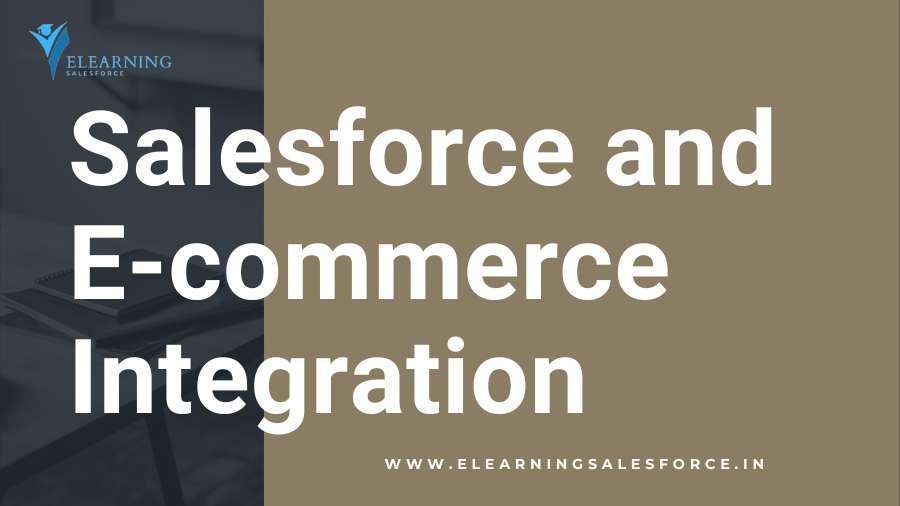Salesforce and E-commerce Integration: In the dynamic world of e-commerce, staying ahead requires powerful tools that seamlessly integrate and elevate operations. Salesforce emerges as a game-changer in this realm, offering a comprehensive solution for businesses looking to integrate their e-commerce platforms. Let’s delve into the synergy between Salesforce and e-commerce, exploring the benefits, features, and real-world success stories.
Introduction
Salesforce, known for its prowess in customer relationship management, enters a new realm of significance when integrated with e-commerce platforms. In an era where online transactions dominate, the marriage of Salesforce and e-commerce is more than a strategic choice—it’s a necessity for businesses aiming to thrive in the digital marketplace.
The Power Duo: Salesforce and E-commerce
Imagine a scenario where every customer interaction, from browsing to purchase and beyond, is seamlessly tracked and optimized. This is the promise of integrating Salesforce with e-commerce. The symbiotic relationship between these two entities unlocks a realm of possibilities for businesses seeking efficiency, personalization, and growth in the e-commerce landscape.
Salesforce Features for E-commerce Integration
Salesforce brings a robust set of features to the table, tailored specifically for the demands of e-commerce. Automation tools streamline repetitive tasks, personalization features enhance the customer experience, and advanced analytics provide valuable insights for strategic decision-making.
Streamlining Sales Processes
E-commerce is all about conversions, and Salesforce excels in enhancing the entire sales process. From tracking leads to managing orders and maintaining customer communication, Salesforce ensures that e-commerce transactions are smooth and optimized for success.
Enhancing Customer Experience
In the competitive e-commerce arena, customer experience is a differentiator. Salesforce contributes to a positive customer journey by providing real-time data for personalized recommendations, targeted communication, and a user experience that keeps customers coming back.
Integration Challenges and Solutions
While the benefits are vast, integrating Salesforce with e-commerce platforms may pose challenges. From compatibility issues to data migration complexities, businesses may face hurdles. However, strategic planning, collaboration with experts, and leveraging Salesforce’s support can overcome these challenges.
E-commerce Growth Strategies with Salesforce
For e-commerce businesses eyeing growth, Salesforce offers a scalable and flexible solution. Whether expanding product lines, entering new markets, or adapting to evolving trends, businesses can leverage Salesforce to support and propel their growth strategies.
User-Friendly Interface for E-commerce Teams
Complexity should not hinder productivity. Salesforce’s user-friendly interface ensures that e-commerce teams can easily navigate and utilize its features. This simplicity enhances productivity, allowing teams to focus on what they do best—delivering exceptional products and services.
Data Security in E-commerce Operations
The e-commerce landscape is rife with sensitive customer information. Salesforce recognizes the critical importance of data security and implements robust measures to safeguard this information, earning the trust of both businesses and customers.
Success Stories of E-commerce Businesses with Salesforce Integration
Consider Company X, which witnessed a 25% increase in sales after integrating Salesforce with its e-commerce platform. Company Y streamlined its order fulfillment process, resulting in a 30% improvement in customer satisfaction. These success stories are a testament to the transformative impact of Salesforce in the e-commerce sector.
Training and Support for E-commerce Teams
Embracing a new system requires training, and Salesforce provides extensive resources for e-commerce teams. From online tutorials to dedicated customer support, businesses can ensure that their teams are well-equipped to harness the full potential of Salesforce.
Common Misconceptions about Salesforce and E-commerce Integration
Some businesses may harbor misconceptions about the complexity or costliness of integrating Salesforce with e-commerce. However, with proper understanding and guidance, these misconceptions can be dispelled, opening the door to a world of possibilities.
Future Trends in Salesforce and E-commerce Integration
As technology evolves, so does the synergy between Salesforce and e-commerce. Keeping an eye on emerging trends, such as AI-driven personalization and enhanced automation, positions businesses at the forefront of innovation.
User Testimonials
“I never realized the impact Salesforce could have on our e-commerce operations until we integrated. The level of personalization and efficiency it brings is a game-changer.” – John, E-commerce Manager.
Conclusion
In conclusion, the integration of Salesforce with e-commerce is not just a trend; it’s a strategic move for businesses aiming to thrive in the digital age. The features, scalability, and success stories highlight the transformative potential of this synergy. As the e-commerce landscape continues to evolve, businesses adopting Salesforce integration are poised for sustained growth and success.
FAQs
- Is Salesforce integration only for large e-commerce businesses, or can smaller ones benefit too?
- Salesforce integration is scalable and beneficial for businesses of all sizes, offering tailored solutions for varying needs.
- How quickly can a business see tangible benefits after integrating Salesforce with its e-commerce platform?
- The timeline varies, but many businesses report improved efficiency and customer satisfaction shortly after integration.
- Does Salesforce integration require extensive changes to existing e-commerce workflows?
- While some adjustments may be needed, Salesforce is designed to seamlessly integrate with existing workflows, minimizing disruption.
- What security measures does Salesforce employ to protect customer data in e-commerce transactions?
- Salesforce implements robust encryption, access controls, and other security measures to safeguard sensitive customer information.
- Is ongoing support available from Salesforce after the initial integration?
- Yes, Salesforce provides ongoing support to businesses, ensuring they can adapt to growth, overcome challenges, and stay ahead in the ever-evolving e-commerce landscape.
